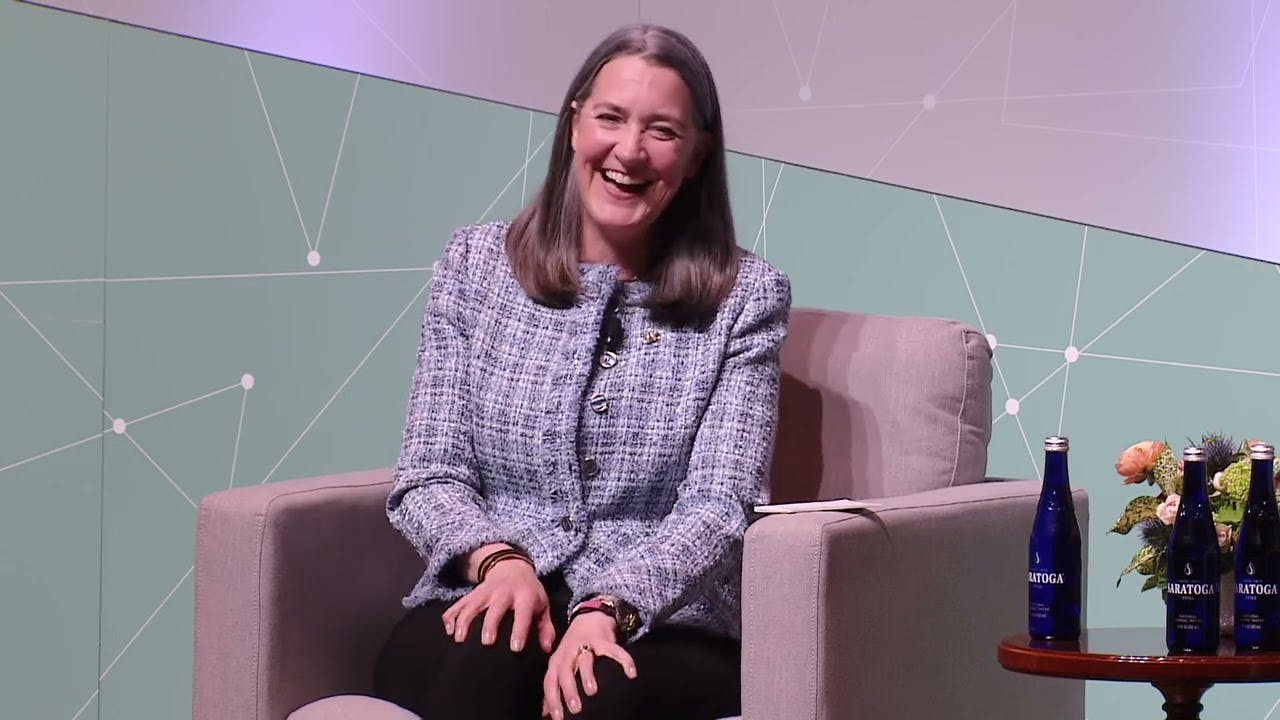Business Government and Society Forum Conversation with Patti Poppe, PG&E CEO
()

PG&E's Transformation and Safety Culture
- Patty Poppe, CEO of Pacific Gas and Electric Company (PG&E), discussed the challenges faced by the company, including the 2010 San Bruno gas line explosion, wildfires, and bankruptcy.
- Poppe emphasized building a culture of safety, considering potential risks, and implementing safety buffers in every job and action.
- She described PG&E's purpose as serving communities, protecting the planet, and leading with care and concern for employees and customers.
Infrastructure Investments and Climate Resilience
- The speaker highlighted the commitment to safety and progress in reducing wildfire risks.
- Climate-resilient infrastructure was discussed to address changing weather conditions and extreme events.
- Undergrounding power lines was seen as a key strategy to reduce wildfire risks, despite its high cost.
- The "simple affordable model" was introduced, aiming to balance infrastructure investment with customer affordability.
- Undergrounding 8% of high-risk power lines can lead to long-term cost savings by reducing maintenance and vegetation management expenses.
- Attracting capital from capital markets for infrastructure investments can lower operating expenses and stabilize energy costs.
Balancing Customer and Shareholder Interests
- The speaker emphasized the importance of regulatory oversight and public input in decision-making processes related to infrastructure investments.
- Balancing the interests of customers and shareholders in the utility industry was discussed.
- It was argued that investing in infrastructure and reducing operating expenses can serve both customers and investors, leading to lower prices and a return on investment.
- Load growth through electrification of transportation, buildings, and data centers was highlighted as a means to reduce costs and decarbonize the economy.
Community Solar and Net Energy Metering
- The challenges of community solar and the need for appropriate pricing structures were acknowledged, especially for low-income communities.
- The current net energy metering cost allocation incentivized investment in new technologies but is unsustainable in the long term.
- A fixed charge for all customers was proposed to equalize the utilization of distributed resources and reflect ongoing maintenance and grid operating costs.
- The proposed fixed charge has three tiers aligned with the existing income-graduated rate structure, with lower charges for low-income customers.
- Community solar programs can provide access to clean energy for those without rooftop access or the ability to participate in traditional solar installations.
Nuclear Energy and Safety
- Nuclear energy was considered a part of the future energy mix, with small modular reactors seen as a promising technology.
- PG&E's commitment to safety was reiterated, with efforts to enhance grid safety after the 2020 wildfires.
Business, Government, and Society
- The speaker reflected on their role in co-leading the task force on business, government, and society at Stanford University.
- Increased engagement between students, faculty, alumni, business leaders, politicians, regulators, and civil society leaders was encouraged to address complex questions about the role of business in society.
- The positive impacts of business were acknowledged, but tradeoffs and decision-making challenges were recognized, requiring societal structures and government policies to shape the positive aspects of business and capitalism.
- Disagreements among individuals within and outside the event about specific decisions and policies were acknowledged, emphasizing the need for respectful discussions and debates.
Event Conclusion and Gratitude
- Gratitude was expressed to speakers, faculty members, GSB staff, Professor Joe Petrovski, and Maria France for their contributions to the event's success.
- The event was an experiment to bring together a large group for discussions, and feedback will be sought to assess its effectiveness.
- The speaker concluded by thanking the attendees and inviting them to continue the discussions during the reception.